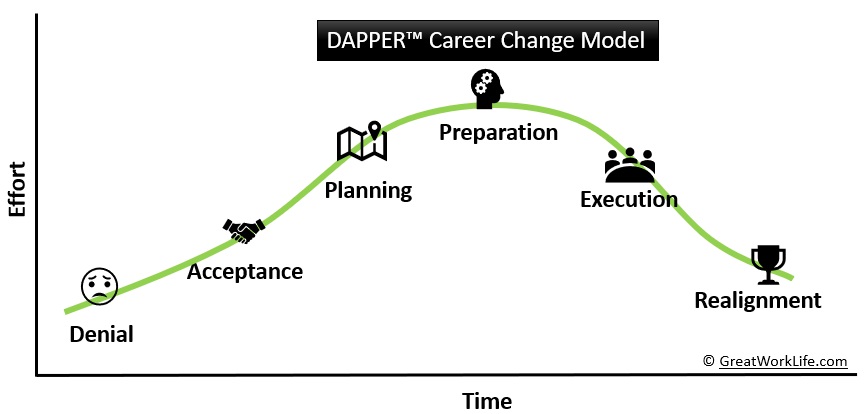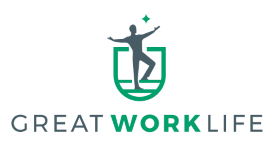Our process model for managing career change involves six stages. Career change is hard, but the DAPPER™ Model helps you easily move from denying you need a change to realigning to your new career. Read on to find out more.
The 6 Stage DAPPER™Model for Managing Career Change
Denial: This is the state of inertia in which you do not believe you need a career change. You brush your frustrations and powerlessness aside and keep churning away at your current career, even though inside, you know it is time for a change.
Acceptance: Things have reached a point at work where you realize you have to change; things cannot continue like this. You only have one life, and that life needs a refresh.
Planning: The key stage of self-analysis and soul searching, you commit to reflecting upon your passions, principles, and what makes you happy in work and life
Preparation: You now know what general direction you want to head, have a goal, and need to prepare for change. Skills, experience, and knowledge may need reworking to prepare for the career move.
Execution: You are ready to execute your plan. The job search begins; you reach out to your network, build new networks, and apply for new jobs.
Realignment: You have landed the job, started the business, and have a stream of freelance work that enables you to transition from your old work life to your new work life.

Denial
Many people remain in a state of inertia for many years after realizing that their work life is unfulfilling. It may be that the career they have chosen has become monotonous or dull over the years. It might not be the career; it could be the company they work for that has values that are not aligned with their personal values. Businesses in decline, shrinking markets, or otherwise in extremely competitive environments can develop an aggressive or highly political culture that does not favor employee well-being.
Most employees will rationalize mass redundancies, political infighting, or rough management practices by saying to themselves, “This will not happen to me.” Sometimes, this behavior can change employees’ behavior, making them act more aggressively or politically.
The employee is in a period of denial, denying that what is happening is against their principles and adjusting their principles accordingly. Too much maladjustment of one’s values causes stress, anxiety, and burnout.
You may be facing this dilemma now. I know I have been through this entire process.
Acceptance
Things have reached a point at work where you realize you have to change; you cannot continue on this path. The acceptance stage can be scary because it dawns on you that accepting this change means you have a lot of work and stress ahead of you.
The key here is to understand that you will be designing and planning a better work-life for yourself and a more confident and satisfied person for your friends and family as you move forward. If you are happy and fulfilled at work, where you spend most of your productive life, you will be a better father, mother, brother, sister, and friend.
You have accepted that you have only one life and that life needs a refresh.
The only way to reduce your anxiety about a career change is to jump headfirst into the planning process.
Planning
In the key stage of self-analysis and soul-searching, you commit to reflecting upon your passions, principles, and what makes you happy at work and in life. If your values and principles have been impacted, it is time to rediscover them. You need to unearth what makes you happy.
Key Questions When Planning For A Career Change:
- What elements of your job did you enjoy?
- What tasks did you detest?
- Which of your skills are the strongest and most transferrable?
- How free are you financially? Can you take a pay cut to be more fulfilled?
- Do you have money set aside to invest in your education or certification in your new line of work?
- What is your dream job? Can you align your passions for golf, wine, food, travel, technology, or writing with your future career?
Once you have created your plan, it is time to prepare for the move.
Preparation
The preparation stage is essentially preparing or equipping yourself for what lies ahead so you can achieve your career move.
You now know what general direction you want to head, have a rough idea of your goals, and need to prepare for change. The preparation stage can be one of the longest in terms of time, and certainly, the largest amount of effort needs to be invested. Retraining, certification, and building experience all take time and effort.
Core Considerations When Preparing:
- Which of your skills are transferable?
- Which new skills need developing?
- Do you need certifications for your new role?
- Do you need some industry experience before applying for a paid job?
- Is there a local market or employers for your chosen career path?
- Will you need to relocate?
- How long will this take? Can you stay in your current role for this duration?
At this stage, you can begin to build your new network in your industry or career of choice, joining meetup groups to learn and make new acquaintances.
Execution
You are prepared, you have done the research, you have attained the news skills and certifications you require, it is now time to execute. Execution is essentially finding that new job.
Key Steps in Execution:
- Building your new CV/resume
- Probing acquaintances at your meetup groups
- Searching for jobs online
- Attending interviews
You are ready to execute your plan. The job search begins. You reach out to your network, build new networks, and apply for new jobs.
Realignment
You have landed the job, started the business, and have a stream of freelance work that enables you to transition from your old work life to your new work life. This is the fruit of your labor; enjoy it.
Enjoy the leaving party, and try not to leave a trail of debris in your wake.
5 Inspiring & Practical Books on Career Change
📖 Switchers by Dr. Dawn Graham
How Smart Professionals Change Careers and Seize Success
A highly rated book that asks you to consider if you are ready to switch your career.
If the answer is yes, then Dr. Graham outlines an in-depth plan and road map to help you gather your thoughts, understand your values, and ultimately execute the change.
This is a leading resource worth reading if you seek to change your career.
📖 What Color Is Your Parachute? by Richard N. Bolles
A Practical Manual for Job-Hunters and Career-Changers Paperback
Known as the world’s most popular job-hunting guide, “What Color Is Your Parachute” is a practical guide to helping you make a job transition.
The emphasis is on discovering your core values and what motivates and drives you.
Using Bolles’ Flower Excercise, you should discover your key passions and transferable skills. This should enable you to define and execute a clear plan for a fulfilling career and a happier you.
📖 Designing Your Life by Bill Burnett
How to Build a Well-Lived, Joyful Life
This New York Times Bestseller provides inspiring insights on designing and building your ideal life, a meaningful life designed specifically for you.
Designing Your Life is highly rated by its readers, and I found it to be a fun experience to discover who I really am and what I really like and value.
The book also focuses not on the end goal but on the journey to a fulfilling life. I highly recommend this book.
📖 Halftime by Bob P. Buford
Moving from Success to Significance
Halftime takes a different approach to career change. First, it focuses on people in leadership positions who have already experienced some success. It explores the question, “Well, you have achieved career success, but are you feeling fulfilled?”
If the answer to that question is no, this book might be for you.
Targeted at the over 40s, this book might contain the inspiring insights you need.
📖 Why Bother by Jennifer Louden
Discover the Desire for What’s Next
Loved by its readers, Why Bother examines the key question of motivation. Ultimately, motivation drives us to change, adapt, and even make a mid-life career or life change.
After decades of working, commuting, raising children, and paying your mortgage, it is normal to feel fatigued and tired of life.
Why Bother helps us rediscover why we should indeed bother to change and how to reimagine our lives as we emerge from the fog that is raising a family and working 9 to 5 for 20 years.
DAPPER Model For Career Change Summary
I hope this model provides structure and clarifies the journey from the old to the new more personally fulfilled you.
